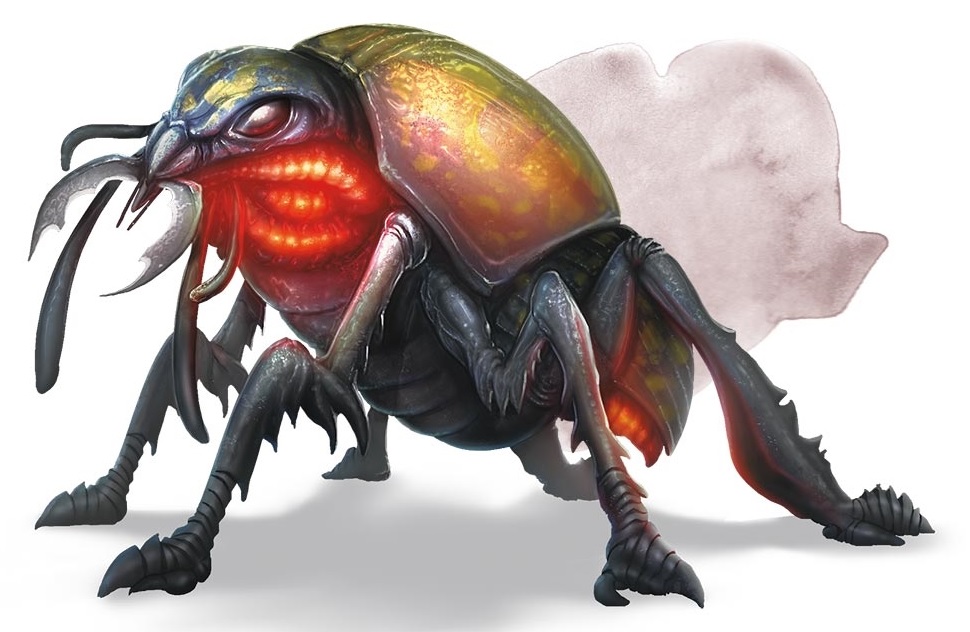Difference between revisions of "Fire Beetle"
Tao alexis (talk | contribs) |
Tao alexis (talk | contribs) |
||
| Line 19: | Line 19: | ||
}} | }} | ||
| − | These subterranean beetles are carnivorous meat-eaters | + | These subterranean beetles are carnivorous meat-eaters, able to strip a body to its bones within a few days, consuming even the entrails in their voraciousness. |
| − | Every 10–15 months, | + | Every 10–15 months, a fire beetle obtains a large host for its eggs (at least 150 lbs) and kills it. It will then cocoon the body in strands of a fibrous, waxy substance that the beetle produces; then the body is injected with eggs and buried. A 4–40 fire beetle larvae. Those larvae that mature the fastest will eat their own kind, resulting in a brood that is typically about a dozen fire beetles in number. |
The fibrous waxy substance that they produce from their mouths is a mucus that is created from eating wooden roots and plants, typically that have grown down from the surface. This mucus is deposited slowly over time, emerging as a slime but become flexible. The beetles will cover all the parts of their lair that is used continuously in this substance, which will be spongy to walk on but have no appreciable effects on combat. | The fibrous waxy substance that they produce from their mouths is a mucus that is created from eating wooden roots and plants, typically that have grown down from the surface. This mucus is deposited slowly over time, emerging as a slime but become flexible. The beetles will cover all the parts of their lair that is used continuously in this substance, which will be spongy to walk on but have no appreciable effects on combat. | ||
Revision as of 23:04, 24 February 2020
| Species | insect (glandulae ignis) |
| No. Appearing | 2–16 |
| Behaviour | parasocial |
| Range | subterranean |
| Size | 2½ ft. long |
| Weight | 40 lbs. |
| Intelligence | 0 |
| Armour Class | 4 |
| Hit Dice | 1+2 |
| Action Points | 5 |
| Max. Stride | {{{stride}}} |
| THAC0 | 20 |
| Hp/Die | d4 |
| Attack Forms | pincers |
| Damage | 2–8 |
| Special Attacks | create light |
These subterranean beetles are carnivorous meat-eaters, able to strip a body to its bones within a few days, consuming even the entrails in their voraciousness.
Every 10–15 months, a fire beetle obtains a large host for its eggs (at least 150 lbs) and kills it. It will then cocoon the body in strands of a fibrous, waxy substance that the beetle produces; then the body is injected with eggs and buried. A 4–40 fire beetle larvae. Those larvae that mature the fastest will eat their own kind, resulting in a brood that is typically about a dozen fire beetles in number.
The fibrous waxy substance that they produce from their mouths is a mucus that is created from eating wooden roots and plants, typically that have grown down from the surface. This mucus is deposited slowly over time, emerging as a slime but become flexible. The beetles will cover all the parts of their lair that is used continuously in this substance, which will be spongy to walk on but have no appreciable effects on combat.
Attacks are usually initiated by a single creature, which when hurt will release a pheromone into the air that will call others of its nest. Within a few rounds, the remaining beetles will swarm intruders. Fire beetles are dangerous to 1st level parties.
Fire beetles have two glands that may be located above or below the eyes, depending on the variety. These will give off a red glow, which will be collected by the mucus covering upon the nest so as to produce daylight conditions for seeing. This makes the beetle more vulnerable to intelligent creatures, but the light will often draw in less intelligent creatures that can then be killed and eaten. The glands must be removed within a few hours of the beetle's death, else the beetle's biology will cause the gland to rot. Often, however, other fire beetles will consume the dead before this happens. Once the glands are removed, they will continue to glow for 3–36 hours, unless sustained with the cantrips freshen, polish or warm — whereupon the gland's illumination will last for 2–8 days. If the gland is drained by an alchemist while still glowing, the fragile substance inside is an important ingredient in a number of potions and magic items. Active glands can fetch between 5–15 g.p. each, depending on the market.
See Bestiary.
